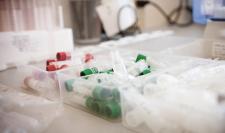FDA Faces Push to Loosen Rules for Sperm Donations
By Amy Dockser Marcus,
The Wall Street Journal
| 04. 25. 2022
After years of public criticism, the Food and Drug Administration in 2020 relaxed its rules regarding blood donation by men who have sex with men. Now the agency is being asked to consider revising its policy again—this time to facilitate sperm donations by these men.
The FDA requires sperm banks to test all donors for HIV, the virus that causes AIDS, and other pathogens and to quarantine vials for at least six months so that the donors can be retested. In addition to establishing these precautions, the agency has long prohibited donations from men who acknowledge having had a male sex partner within the previous five years.
“The FDA believes that overlapping safeguards in place for anonymous semen donations adequately and appropriately reduce the risk of transmission of communicable diseases,” an agency spokeswoman said.
Professional and advocacy groups are seeking changes to the agency’s policies.
The American Association of Tissue Banks has asked the FDA to apply its updated rule for blood donation to all types of tissue, a term that encompasses corneas and skin as well as sperm. Blood...
Related Articles
By Dana Mattioli, The Wall Street Journal | 04.15.2025
Image "Elon Musk" by Debbie Rowe on Wikimedia Commons
licensed under CC by S.A. 3.0
Ashley St. Clair wanted to prove that Elon Musk was the father of her newborn baby.
But to ask the billionaire to take a paternity...
By Emma McDonald Kennedy
| 04.24.2025
A Review of Eggonomics: The Global Market in Human Eggs and the Donors Who Supply Them by Diane M. Tober
A recent journalistic investigation of the global egg trade at Bloomberg put the industry’s unregulated practices and their exploitative implications back in the spotlight. Diane Tober’s book Eggonomics: The Global Market in Human Eggs and the Donors Who Supply Them, published in October of last year, delves even more deeply into the industry with a thorough examination of egg...
By Sarah Jones, Intelligencer | 04.17.2025
From the Natalism website
Elon Musk may not have appeared at the Natal Conference in Austin, Texas, this year, but he didn’t have to. The very concept of pronatalism owes its current prominence to him and his obsession with fertility...
By Staff [cites CGS' Katie Hasson], Radio New Zealand | 04.05.2025
At a time where some countries are struggling with low birth rates, the voices for pronatalism are getting louder. But it’s who’s sounding the call for more babies that has people talking.
Tech giant Elon Musk has fourteen children and...




